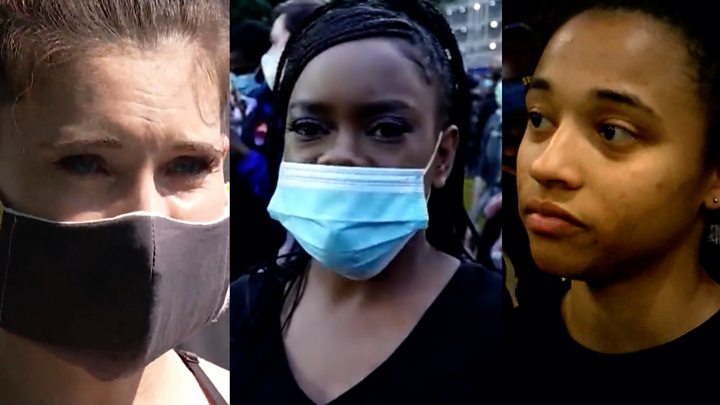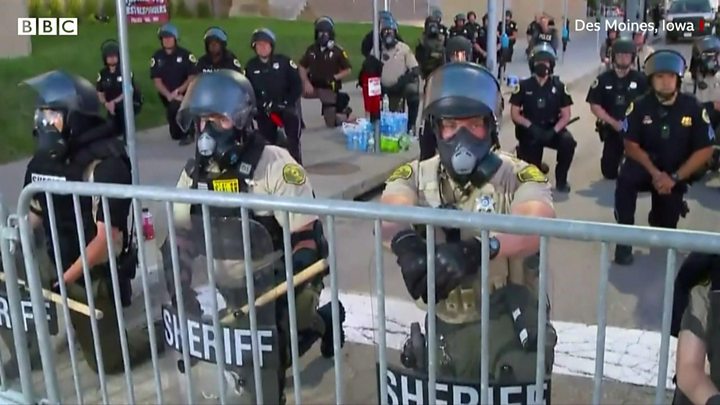Media playback is unsupported on your device
Washington’s Catholic Archbishop strongly criticised President Donald Trump’s visit to a shrine as civil unrest continues in the US over the death of a black man in police custody.
The visit “misused” and “manipulated” the Saint John Paul II National Shrine, Archbishop Wilton D. Gregory said, adding that he found it “baffling and reprehensible”.
Anger over the killing of George Floyd as well as systemic injustice are fuelling protests, film-maker Spike Lee told the BBC in an interview.
On Monday Mr Trump threatened to send in the military to quell disturbances, vowing to “dominate the streets.”
Peaceful and violent protests sparked by the killing of George Floyd in Minneapolis on 25 May continued overnight.
The president said that he would deploy the army if cities and states failed to control the protests.
But on Tuesday at least one city mayor rejected the use of National Guard and military forces.
Presidential candidate Joe Biden criticised Mr Trump for using the crisis to appeal to his supporters, saying he was “serving the passions of his base”.

Media playback is unsupported on your device
Dozens of people have been injured as authorities used tear gas and force to disperse protests which have swept more than 75 cities.
On Tuesday the Las Vegas sheriff said an officer died in a shooting after police attempted to disperse a crowd, and four officers were injured on Monday in St Louis, Missouri.
George Floyd death
What have religious leaders said?
In a statement ahead of the president’s visit to the Saint John Paul II National Shrine, Archbishop Wilton D. Gregory said it violated the church’s religious principles.
Catholics should defend the rights of all people, he said.
The archbishop also condemned the forceful clearing of protestors outside the White House on Monday to allow Mr Trump to visit a church where he held a bible in front of gathered press.
Saint John Paul “would not condone the use of tear gas and other deterrents to silence, scatter or intimidate [protestors] for a photo opportunity in front of a place of worship,” he commented.
US President Donald Trump’s signalling of religious affiliation has not been welcomed by a range of clerics as the nation struggles to manage the twin challenges of a pandemic and widespread political protest.
President Trump does not belong to a particular congregation, only occasionally attends a service and has said many times that he does not like to ask God for forgiveness.
But while he may not consider church essential to his personal life, it may yet hold the keys to his political future.
In 2016, Mr Trump won 81% of white evangelical votes and exit polls found that white Catholics supported him over Hillary Clinton by 60% to 37%.
Archbishop Gregory is the first African-American to lead the diocese.
The shrine is run by the Knights of Columbus, an all-male Catholic organisation that has lobbied for conservative political causes.
Washington’s Episcopalian bishop, Mariann Budde, also condemned the president’s actions.
In the UK the archbishops of York and Canterbury said the unrest exposed “the ongoing evil of white supremacy”.
What’s the latest in the protests?
Both peaceful and violent unrest continued in dozens of cities Monday night, with episodes of looting.
- The National Guard and military should not come to New York City, said mayor Bill de Blasio
- After the city’s iconic department store Macy’s and other shops were looted, New York Governor Andrew Cuomo criticised the police for “not doing their jobs”. Nearly 700 arrests were made on Monday
- Curfews in New York City are extended to Sunday, as well as in Philadelphia until Thursday
- In Chicago, two people were reported killed amid unrest, although the circumstances are unclear
- The chief of police in Louisville, Kentucky has been sacked after law enforcement officers fired into a crowd on Sunday night, killing the owner of a nearby business
- Australian PM Scott Morrison has demanded an investigation into the alleged assault by police of two Australian journalists covering protests in Washington DC
- Music channels and celebrities have pledged to mark Blackout Tuesday, pausing for eight minutes – the length of time a police officer knelt on Mr Floyd’s neck
How did protests begin?
The protests began after a video showed Mr Floyd, 46, being arrested in Minneapolis on 25 May and a white police officer continuing to kneel on his neck even after he pleaded that he could not breathe.
The officer, Derek Chauvin, has been charged with third-degree murder and will appear in court next week. Three other police officers have been fired.
The Floyd case has reignited deep-seated anger over police killings of black Americans and racism. It follows the high-profile cases of Michael Brown in Ferguson, Missouri; Eric Garner in New York; and others that have driven the Black Lives Matter movement.
For many, the outrage also reflects years of frustration over socio-economic inequality and discrimination, not least in Minneapolis itself.
On Monday Mr Trump called on cities and states to deploy the National Guard, the reserve military force that can be called on to intervene in domestic emergencies, “in sufficient numbers that we dominate the streets”.
Mr Trump said “all Americans were rightly sickened and revolted by the brutal death of George Floyd” but said his memory must not be “drowned out by an angry mob”.

Media playback is unsupported on your device
He said if a city did not “take the actions that are necessary… then I’ll deploy the United States military and quickly solve the problem for them.”
In order to take that step, the president would have to invoke the Insurrection Act, which in some circumstances first requires a request from state governors for him to do so.
This law was last invoked in 1992 during riots in Los Angeles following the acquittal of four police officers charged with assaulting black motorist Rodney King.
How has the unrest affected you? Share your experiences by emailing haveyoursay@bbc.co.uk.
Please include a contact number if you are willing to speak to a BBC journalist.
Click Here to Visit Orignal Source of Article https://www.bbc.co.uk/news/world-us-canada-52897303


